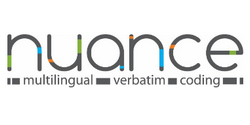Copy of `Nuance - Coding expertise`
The wordlist doesn't exist anymore, or, the website doesn't exist anymore. On this page you can find a copy of the original information. The information may have been taken offline because it is outdated.
|
|
|
Nuance - Coding expertise
Category: Games and Entertainment > Coding glossary
Date & country: 01/02/2017, USA
Words: 26
|
Text AnalyticsThe process of extracting the meaningful information from text using natural language processing. Also known as Text Mining.
Text MiningSee Text Analytics
Unstructured DataRefers to free-form text or data that does not reside in fixed locations.
VerbatimA respondent's exact answer (recorded word for word) to an open-ended question.
Web ScrapingSee Data Scraping
RespondentsThe people who respond to and participate in a research study.
Secondary DataPreviously collected and published data.
Sentiment AnalysisThrough natural-language processing, sentiment analysis refers to a computer or machine classifying textual responses as positive, neutral, or negative.
Structured DataData that resides in fixed locations, or a fixed set of answers to a given question.
Respondent IDA unique code (usually a numeric sequence) assigned to each respondent to identify that respondent during the course of a study and to identify that respondent's answers in the study data file.
Raw DataSurvey data before it has had quality-assurance processing, tabulation, analysis, or interpretation.
Quantitative ResearchMarketing research based on large samples, structured questionnaires, surveys, and numeric analysis of the results. Quantitative research can also be applied to database analytics and the quantitative analysis of other marketing data sets.
QuestionnaireA set of questions asked in order to collect the data necessary to fulfill the objectives of a research project.
Open-Ended QuestionsQuestions that ask respondents to reply in their own words.
Preset ListA list of answers to choose from.
Primary DataNew, original data obtained as a result of a survey or research project.
Qualitative ResearchResearch that is open-ended and nondirective in nature so that participants can give any answer they wish. Focus groups and depth interviews are examples of qualitative research techniques. Observation research (ethnography) is also classified as a qualitative technique.
Natural-Language Processing(NLP) NLP is the science of a computer program to understand human speech patterns and meaning.
Data-ScrapingThe process of searching publicly accessible websites such as blogs, social networks, and other sites where people post information about themselves (their interests and hobbies, their hopes and dreams, etc.) and then retrieving or scraping all the relevant information about a brand, product, or service.
IVR(Interactive Voice Response) A system that allows phone callers to provide answers to a programmed voice survey by using the phone keypad or simply saying the answer (voice recognition).
Data CollectionThe process of systematically gathering information (answers, ratings, expenditures, reasons, etc.) related to the subject and purpose of a marketing research project.
Data ProcessingTypically refers to the coding and tabulation processes involved in marketing research studies. The term is also used in information technology and has a broader meaning that encompasses the processing of all data for a company.
CodebookSee Codeframe
CodeframeRefers to the list of codes created to summarize the responses to a question or topic.
Customer-Relationship-Management (CRM) SystemA system or process that tracks all the interactions (sales, marketing, customer service, support, etc.) an organization has with customers. These systems are used to manage client relationships, measure return on investment (ROI), and mine data.
DataThe observations or measurements resulting from surveys, unit or dollar sales, and other types of measurement.

